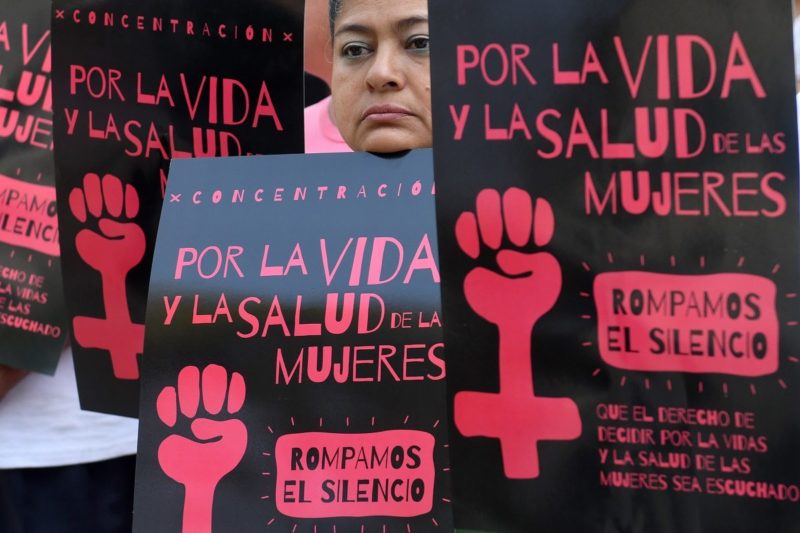United Nations Committee Urges Moratorium on El Salvador’s Total Abortion Ban
The committee's recommendations lend momentum toward a legislative effort to relax the country's abortion law.

After serving more than seven years in prison for an obstetric emergency prosecutors characterized as aggravated homicide, Carmen Guadalupe Vasquez Aldana was granted a pardon from the Salvadoran government in 2015. The national legislature and the courts determined there had been “judicial errors” during her trial.
Vasquez Aldana told her story last month at a meeting of the United Nations Committee on the Convention for the Elimination of All Forms of Discrimination Against Women (CEDAW).
“I told them that I was released from prison because the government gave me a pardon, and that was my only way to get out of prison. But why should I be pardoned for something I didn’t do?” Vasquez Aldana said in a phone interview with Rewire.
“I said I think that the government should sit down with all of us in prison, and they should ask us to pardon them. They are the ones committing an injustice.”
In the wake of the CEDAW committee meeting, the committee issued a recommendation urging the government of El Salvador to revise its total abortion ban. In addition to criminalizing abortion in all circumstances, the ban also contributes to women like Vasquez Aldana being imprisoned for miscarriages or other obstetric emergencies.
The committee’s recommendations lend momentum toward a legislative effort to relax the ban currently taking place in the country. They parallel the language in a recently introduced bill that would decriminalize abortion in some situations. The recommendations suggest that the Salvadoran government should “legalize abortion, at least in cases of rape, incest, threats to the life and/or health of the pregnant woman, or severe fetal impairment.” In addition, the committee urged the government to introduce a moratorium on the enforcement of the current law.
The committee based its recommendations on its concerns about the consequences of an absolute criminalization of abortion, namely “women often resorting to unsafe methods of abortion, thus facing serious risk to health and life.”
It also expressed trepidation about the prosecution of women like Vasquez Aldana for presumed abortion, long periods in pre-trial detention, and disproportionate criminal penalties applied in such cases. It noted that women are frequently incarcerated just after having gone to the hospital in need of care because health personnel are reporting patients to authorities out of fear of being penalized themselves.
“I went to Geneva to represent my friends … who are still in prison. I want all of them free, too,” Vasquez Aldana told Rewire.
Just how a moratorium on the enforcement of the existing law would be executed still needs to be established, along with the other recommendations. As Sara Garcia, coordinator of the Agrupación Ciudadana por la Despenalización del Aborto explained to Rewire, such recommendations become binding only when the Salvadoran government ratifies an “Optional Protocol” (OP-CEDAW) that details a plan for implementation.
El Salvador voluntarily signed the Convention for the Elimination of All Forms of Discrimination Against Women in 1980 and ratified it in 1981. Governments that have ratified the convention have a legal obligation under its provisions to “eliminate all forms of discrimination against women.” Such nations must also ensure that women can develop, advance and “exercise and enjoy their human rights and fundamental freedoms in the same way as men.” And countries must allow the CEDAW committee—a body of 23 independent experts that monitors implementation of the convention—to “scrutinize” their implementation of the treaty at regular intervals.
However, El Salvador has never ratified the accompanying protocol, which would allow the committee’s recommendations to influence the country’s legislation. This “binding” aspect of the protocol is the reason El Salvador has not ratified the protocol, Garcia believes.
In 2016, CEDAW expert Gladys Acosta visited the country and met with civil society organizations and government officials to explain “contents and reach” of the Optional Protocol as part of an effort to promote its ratification.
In the context of that visit, Sí a la Vida El Salvador (Yes to Life), an anti-choice organization, criticized CEDAW on its webpage for allowing the implementation of what they termed an “abortionist protocol” that would allow the 23 “experts” (emphasis present in text) to make recommendations and override “local legal, political and legislative sovereignty.”
Karla Hernandez, Sí a la Vida supporter and a legislator from the conservative ARENA party, stated on the site, “I am worried that ratifying this protocol will grant sovereignty to a supranational body that then forces us to decriminalize abortion.” (As Angelica Rivas, attorney for the Agrupación and the Feminist Collective, and one of the Salvadoran civil society delegates to the CEDAW conference, pointed out to Rewire, there is no threat to national sovereignty because the government signs all international treaties “voluntarily.”)
Such resistance is still widespread throughout El Salvador. However, Garcia observed in an interview with Rewire, in El Salvador, “the social climate is changing rapidly. The stigma around abortion has diminished. More diverse voices and political positions are coming forward in the debates on abortion.
“It is no longer seen as the ‘evil, satanical’ topic that it once was. The discussion has become more rational and ethical, more inclusive.”
Garcia added that CEDAW’s recommendations raise the bar for the entire country in the fight to reform El Salvador’s anti-abortion law and ensure greater access to sexual and reproductive rights for women.
“Compliance with the convention and the recent recommendations is the responsibility of the entire Salvadoran population, not just feminist groups or human rights groups,” Garcia said.

